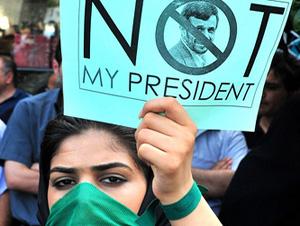Clinton: Iran is becoming ‘military dictatorship’
A protester in Iran, June 2009. (Image via Flickr user Hamed Saber (cc: by-nc-sa))
This story is adapted from a broadcast audio segment; use audio player to listen to story in its entirety.
Story by Laura Lynch, PRI’s “The World”
Iran is veering toward a military dictatorship — that’s the word from Secretary of State Hillary Clinton. Speaking in Qatar on Monday, Clinton said Iran’s Revolutionary Guard is increasingly dominating the government in Tehran. She made the comments as she seeks support for tougher sanctions targeting Iran’s nuclear program.
“Iranian officials have refused every offer to meet on its nuclear program,” said Clinton. “So these actions, understandably, have caused us to wonder, what does Iran have to hide?”
Clinton’s words were among the strongest she’s used since President Obama offered to engage with Iran.
Clinton’s trip to Qatar is part of an effort to gather support for tough, new sanctions against Iran, and she made her case by warning that the country is becoming a military dictatorship.
“We are planning to try to bring the world community together in applying pressure to Iran through sanctions adopted by the United Nations that will be particularly aimed at those enterprises controlled by the Revolutionary Guard which we believe is, in effect, supplanting the government of Iran,” she said. “That is how we see it.”
In Tehran, the state-owned Arabic language TV channel, Al-Alam, which broadcasts to Arab nations, accused Clinton of trying to turn the world against Iran.
“A coordinated campaign intensifies day by day, after every announcement made by Iran on its nuclear, space or defense developments,” said a Al-Alam announcer. “The US Shuttle diplomacy is aimed at incitement against Tehran.”
But for others, Clinton’s assessment wasn’t news at all.
“I think what Secretary Clinton was saying was essentially catching up to the reality of Iran,” said Afshin Molavi, an Iranian analyst with the New America Foundation. “I also think it reflects the frustration that the Obama administration is feeling about Iran because they do feel that they went out on a diplomatic ledge and Iran did not meet them halfway.”
Observers say the Revolutionary Guard has been extending its control in Iran for years with the blessing of the Supreme Leader, Ayatollah Khameini.
Rasool Nafisi of the Rand Corporation, who has written a book about the Revolutionary Guard, says the process started with the revolution.
“Because the Revolution Guards are a new phenomenon in Iran, combining political and military and security functions together,” said Nafisi. “What happened under Ayatollah Khomeini, the process accelerated to the point that, in the 2005 election, the takeover of the state was relatively completed.”
He says that means the Guard has former members in the judiciary, the legislature, and of course, at the top of government including President Mahmoud Ahmedinajad.
And, Afshin Molavi says, even though the Ayatollah is the nation’s spiritual and constitutional leader, he’s cultivated close ties to the military. “In securing his legitimacy he increasingly looks to the barracks rather than the seminary. And over the past 20 years or so he has increasingly allied himself with elements of the Revolutionary Guard and the question becomes, is the tail wagging the dog? They do need each other.”
Hillary Clinton said on Monday that the United States isn’t seeking to take military action against Iran, but she does want help in hitting the Revolutionary Guard where it hurts. In the past few years the Guard has built up a lucrative and influential business portfolio controlling hundreds of key companies. So it’s no surprise Clinton is urging others on the UN Security Council to support additional sanctions targeted at the economic interests controlled by the Guard.
PRI’s “The World” is a one-hour, weekday radio news magazine offering a mix of news, features, interviews, and music from around the globe. “The World” is a co-production of the BBC World Service, PRI and WGBH Boston. More “The World.”
